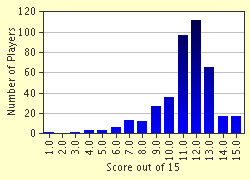Quiz Answer Key and Fun Facts
1. Is it correct to say that throughout most of world history the area of North America now covered by the United States of America was an inferior region of America, in the eyes of some historians?
2. There were approximately 10 million native Indians in North America, north of the Rio Grande, at the time of Columbus?
3. Up to the year 1800 approximately how many African slaves had been transported to the Americas?
4. What happened in the area we now know as the United States of America between 1775 and 1783?
5. What happened in the area we now call the United States of America between 1861 and 1865?
6. In which war in the U.S.A. did the following battles occur- Bunker Hill, Princetown, Brandywine, Charleston and Yorktown?
7. In which war in the U.S.A. did these battles occur- Bull Run, Shiloh, Antietam, Gettysburg, Nashville and Five Forks?
8. When was the 13th amendment of the U.S.A. adopted and slavery officially abolished in the U.S.?
9. In his book "A People's History of the United States" Howard Zinn refers to "The Other Civil War" in the U.S.A. in the 19th century (and before). To what events do you think he was referring?
10. Who said in connection with the American Revolutionary War- " A French Bastard landing with a Banditti and establishing himself king of England against the consent of the natives, is in plain terms a very paltry rascally origin. It certainly has no divinity in it"?
11. Did women in America play any part in the battle for workers rights in the 19th century?
12. How do the following people relate to U.S.A history- George Washington, John Adams, Thomas Jefferson, James Madison and James Monroe?
13. Who is known as the 42nd President of the U.S.A.?
14. Which is the odd one out in the following list?
15. What is the first amendment of the U.S. Constitution?
Source: Author
rialto88
This quiz was reviewed by FunTrivia editor
gtho4 before going online.
Any errors found in FunTrivia content are routinely corrected through our feedback system.

